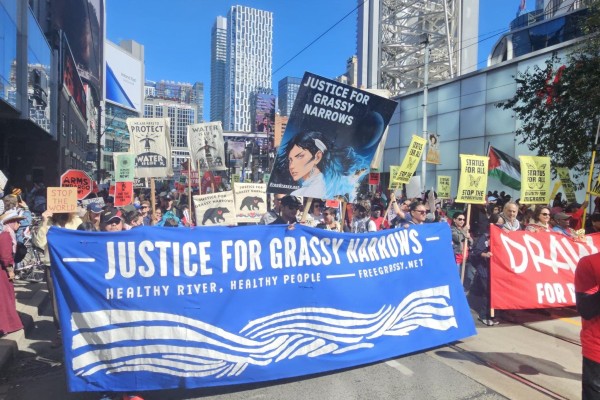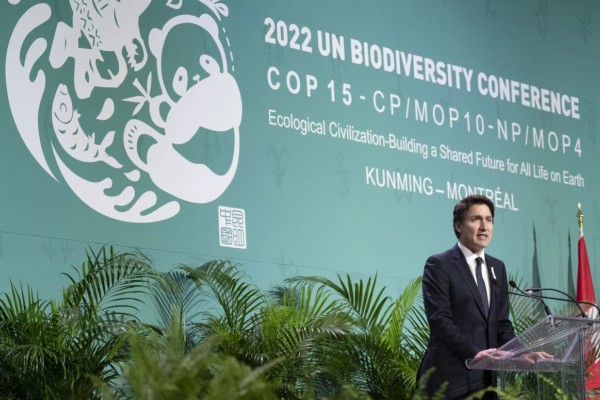As Lasso flails, Ottawa pushes for more Canadian mining in Ecuador
The proposed Canada-Ecuador FTA would greatly expand the power of Canadian mining companies in Ecuador

Ecuadorian President Guillermo Lasso. Photo courtesy Presidencia de la República del Ecuador/Flickr.
As embattled Ecuadorian President Guillermo Lasso faces public disdain, struggles against potential impeachment, and foments regional divides, Ottawa is quietly negotiating a free trade agreement (FTA) with his extremely unpopular government.
The proposed Canada-Ecuador FTA would greatly expand the power of Canadian companies in Ecuador, including through the implementation of a foreign investment protection agreement, or investor-state dispute settlement (ISDS) mechanism. Such agreements give foreign companies the ability to sue national governments in private tribunals if they feel the state in question is interfering with their capacity to earn profits. Oftentimes, this mechanism is invoked when states try to increase tax and royalty earnings on foreign investments or introduce new regulations to protect the environment and human rights.
In the midst of these negotiations, Toronto hosted the annual Prospectors and Developers Association of Canada (PDAC) conference. The purpose of this event is to put representatives from investment-friendly governments into contact with industry figures, with the goal of promoting the transnational mining industry of which Canada is the world’s most notorious champion, serving as home to 75 percent of registered mining companies.
One of the events at PDAC was titled “Ecuador Day: Next mining destination.” The event noted that Ecuador offers “enormous opportunities” in the mineral sector, and that “the [Lasso] government[’s] support for responsible mining and foreign investment makes us a very attractive country.”
It is no surprise that Canadian mining companies are so interested in Ecuador. Canada is Ecuador’s largest foreign investor, due primarily to mining investments. Canadian direct investment in Ecuador is $3.7 billion, approximately four percent of Ecuador’s entire GDP. Since 2017, the year that wildly unpopular right-winger Lenín Moreno took power, Canadian investment in Ecuador has tripled.
PDAC’s Ecuador event was organized by the Mining Chamber of Ecuador, an industry association whose president came out against local consultations with environmental groups and Indigenous communities during a period of anti-mining resistance in 2021. The Mining Chamber’s president, Nathan Monash, is also the vice president of business sustainability at Lundin Gold, a Canadian mining company headquartered in Vancouver.
Ecuadorian social and environmental groups have expressed concern about the FTA generally and Canada’s push to expand mineral exploitation specifically. A statement signed by sixteen such organizations noted that “Free Trade Agreements [are] instruments of transnational corporate power… that grant excessive legal protections to investors while deepening extractivism, deregulating labour and environmental protections, abandon measures to protect small-scale family agriculture [and] privatize basic services.” The statement expressed concern over Canada’s role in deepening these social, economic, and political crises:
[W]e are also concerned that an FTA with Canada will guarantee greater impunity for Canadian investments in the extractive sector, mainly mining, in Indigenous and peasant territories, water recharge areas, and forests, where mining projects are being opposed due to evidence of water contamination. We are concerned that an FTA will lead to deforestation, the destruction of the páramos, forced displacement, a rupture of the social fabric, as well as violence, criminalization, and prosecution of those who defend human rights and the environment.
Canada’s reasons for rushing to implement an FTA with the Lasso government are obvious. In the context of public disapproval, nationwide resistance movements, and skyrocketing violence (some report that Ecuador is on track for its most violent year on record), the Lasso administration has prioritized foreign mining investment over basic public demands for state support. His administration is reviled by the Ecuadorian public—recent polls put his approval rating between 12 and 14 percent—but that doesn’t seem to matter to the Trudeau government or its friends in the mining industry.
Lasso’s friendliness with foreign mining capital seems to be one reason why the Canadian government has not condemned his government’s cruel policies, which have been rejected by the vast majority of Ecuadorians. In fact, during anti-Lasso resistance last year, the Canadian Embassy in Ecuador mimicked the rhetoric of the discredited Ecuadorian right-wing, labelling the protests “violent riots.”
While Canada is negotiating an FTA with Ecuador, the country’s left-wing, politically persecuted under Lasso and his predecessor, is resurgent. In local elections last month, the Citizen Revolution Movement of former president Rafael Correa won nine of the country’s 23 prefectures and 60 mayorships, including in the two largest cities of Guayaquil and Quito. The results reaffirmed that the Citizen Revolution is still the most powerful political force in Ecuador.
While Ecuador under Correa was never averse to foreign investment, the Canadian government has always looked on him and his political movement with suspicion, much preferring the reliable subservience of the right. One can see why in a recent interview with Correa on Mexican television. When asked if he supported free trade, Correa answered, “With smart trade, yes. With dumb openness, never. And check history, not a single country has developed like that… There is not a single country that has developed without proper protectionism.”
As Lasso flails, bleeding public support and allies in the National Assembly, Trudeau is staying on the right-wing’s side, just as he did when Lasso’s predecessor Moreno became the least popular president in modern Ecuadorian history.
It is clear that most Ecuadorians do not view their future as one of neoliberalism, blind openness to foreign capital, and subservience to Canadian mining companies. However, the opinions of the majority have never altered the character of Canada’s neoliberal, pro-corporate, anti-socialist foreign policy, and they aren’t doing so in the case of Ecuador, where Guillermo Lasso has retained Ottawa’s support.
Owen Schalk is a writer from Manitoba. His book on Canada’s role in the war in Afghanistan will be released by Lorimer later this year. To see more of his work, visit www.owenschalk.com.










